
Toyota Motor Thailand expects its car sales to rebound following a slight decrease last year to record growth of 18.5% to 284,000 units in 2022 and looks forward to electric vehicle (EV) development by making Thailand its major production base for EVs.
The Japanese automaker, which commands a 80% market share in Thailand's EV segment, plans to introduce a "bZ" (beyond Zero) car model, which is a battery electric vehicle (BEV), to the country later this year. The bZ concept incorporates the desire to provide customers with value that exceeds mere zero emissions.
This debut is part of its parent firm Toyota Motor Corporation's plan to roll out 30 BEV models by 2030 as it aims to achieve a carbon neutrality target, a balance between carbon dioxide emissions and absorption, by 2050.
Toyota Motor Thailand also sees better prospects for its car sales this year after a dip of 1.9% year-on-year in 2021 to 239,723 units due to a mix of factors ranging from the Covid-19 impact and weak consumer purchasing power to a global semiconductor shortage.

"Car sales in the domestic market decreased but we continued to retain the highest market share of 31.6% in the country," said Noriaki Yamashita, president of Toyota Motor Thailand.
The company expects its market share to increase to 33% in 2022, together with a 25.9% increase in its car production to 647,000 units.
It expects to export 371,000 cars, an increase of 27.2%, this year, said Mr Yamashita.
"Better sales will result from the global economy which is slowly recovering. This will benefit the Thai economy," he said.
However, Mr Yamashita said Covid-19 outbreaks will continue to be a key challenge to the Thai automotive industry.
Total car sales in Thailand are expected to increase by 13.3% to 860,000 units in 2022, up from 759,119 last year, according to Toyota's outlook for the whole industry.
"The pandemic may continue to affect Thai economy this year, but we expect the Thai automotive industry to gradually return to normal," said Mr Yamashita.
He also believes shortages of some auto parts will ease.
In the EV segment, Toyota Motor Corporation aims to sell a total of 3.5 million BEVs a year by 2030.
The company invests 1.2 trillion baht for BEVs, including 0.6 trillion baht for batteries. It will also make another 1.2 trillion baht for hybrid EVs, plug-in hybrid EVs and fuel cell-powered vehicles by 2030.







